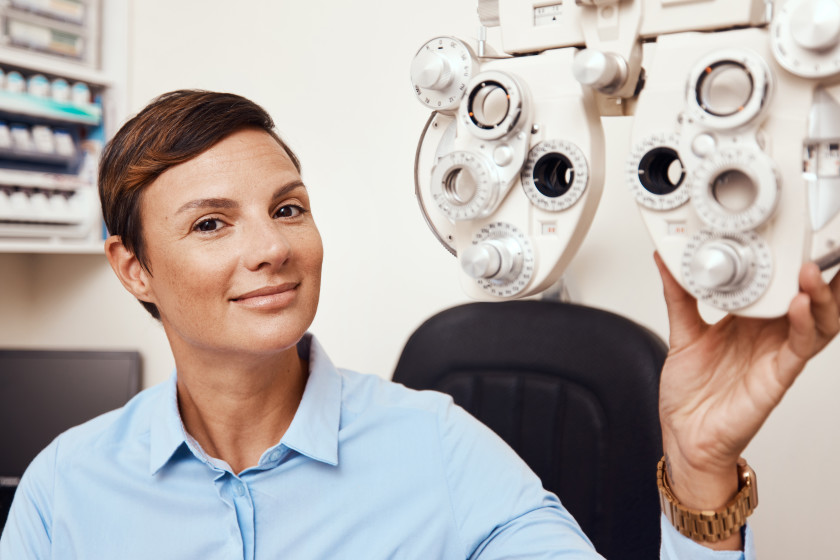50% OFF a Complete Pair of Glasses
*Restrictions apply. Click here for details.

Why Do Optometrists Dilate Your Eyes During Eye Exams?
Whether this is your first dilated eye exam or you’ve had one before, it’s normal to have questions. Why do eye doctors dilate your pupils? What conditions are they checking for? And is it necessary to do this every year?
Keep reading to learn more from Nationwide Vision. Our goal is to help you feel informed, confident, and at ease during your eye exam.
What is Pupil Dilation?
Pupil dilation is a standard part of a comprehensive eye exam. During this procedure, your optometrist uses special eye drops to temporarily widen the black center of your eye, called the pupil. This allows more light to enter and gives the doctor a wider, clearer view of the structures inside your eye.
A dilated exam lets your eye doctor examine the retina, optic nerve, and other areas at the back of your eye. Detecting issues early is key for preserving long-term vision. Some eye conditions that may be discovered during dilation include:
Diabetic retinopathy
Age-related macular degeneration
Glaucoma
Retina detachments
Many eye conditions develop slowly and often show no early symptoms, making pupil dilation an important tool for early detection and timely treatment. In some cases, systemic health issues such as diabetes may also be identified during the exam.
What to Expect During Dilation and How Long It Lasts
Your optometrist will apply dilating eye drops to widen your pupils. An anesthetic drop may be used first to ensure the process is quick and comfortable. Full dilation usually occurs within 15–30 minutes, and eye color can affect how quickly this happens—lighter-colored eyes may dilate faster than darker eyes.
Once your pupils are dilated, they will be less responsive to light. Your eye doctor will use a bright light and magnifying lens to carefully inspect the interior of your eyes, checking for signs of eye disease and evaluating overall eye health.
After the exam, you may notice temporary light sensitivity or blurred vision. These effects typically fade within 1–2 hours, though the duration can vary depending on the eye drops used. Your Nationwide Vision doctor can provide personalized guidance on what to expect after your exam.
How to Prepare for a Dilated Eye Exam
While the eye exam itself is usually quick, dilation can add 30–60 minutes to your appointment. Plan for a slightly longer visit when scheduling. Many patients can drive afterward, but if you are light-sensitive, have a long commute, or are having your first dilated exam, consider having a friend or family member drive you home. Your eyes may be more sensitive to glare, and near vision may be blurry for several hours, so try to postpone tasks requiring fine detail or screen time until later.
Your eye doctor may provide disposable sunglasses for post-exam comfort, but bringing your own pair is recommended. If you wear contact lenses, bring your glasses as well, since your doctor may advise against reinserting contacts immediately to prevent damage. For children, expect a slightly longer visit and bring a snack or favorite activity to make the waiting period more comfortable.
Before your appointment, write down any vision changes or symptoms you’ve noticed—such as flashes, new floaters, headaches, or blurry vision—along with any questions for your optometrist. Being prepared helps ensure your dilated eye exam is smooth, comfortable, and gives your doctor the clearest view of your eye health.
How Often Should You Get a Dilated Eye Exam?
The frequency of dilated eye exams depends on factors like age, medical history, and personal risk. Your Nationwide Vision optometrist can recommend the schedule that’s right for you. Generally, a dilated eye exam may be suggested every one to two years if you:
Are over 60
Are of African American heritage and over age 40
Have diabetes
Have a family history of glaucoma
These are general guidelines, but your eye doctor may recommend more frequent exams if you have existing eye conditions or other risk factors. Regular dilation helps detect potential issues early and protects your long-term vision.

Frequently Asked Questions About Dilated Eye Exams
Schedule a Dilated Eye Exam with Your Local Nationwide Vision
Though a dilated eye exam may take a little extra time, it’s a simple, painless way to thoroughly evaluate your eye health. Regular exams help identify eye conditions early and reduce your risk of vision loss.
Find a Nationwide Vision location near you and schedule your comprehensive dilated eye exam today!
